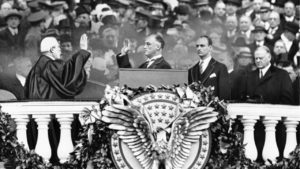
January 23: The 20th Amendment and 24th Amendment

Two Amendments were ratified on January 23rd: the 20th Amendment in 1933 and the 24th Amendment in 1964. The 20th Amendment moved presidential inaugurations to January. This uncontroversial amendment shortened the lame-duck period for politicians and replaced an outdated calendar—with advances in transportation technology, elected officials could assume their roles in Washington much sooner. Hardship for Americans during the winter of 1932-33, at the height of the Great Depression, further highlighted the need for this revision. Franklin Roosevelt had defeated Herbert Hoover in the 1932 presidential election, but neither Roosevelt, not yet in office, nor Hoover, essentially politically powerless following his defeat, could take action.

The 24th Amendment of 1964 abolished poll taxes in federal elections: “The right of citizens of the United States to vote in any primary or other election for President or Vice President, for electors for President or Vice President, or for Senator or Representative in Congress, shall not be denied or abridged by the United States or any State by reason of failure to pay poll tax or other tax.” This abolition, along with the Voting Rights Act (passed the following year), helped make voting possible for a larger and more diverse group of American citizens. Southern states often aimed to limit the number of black voters with poll taxes. Poll taxes were usually $1 or $2, which would be about $20 to $40 today—enough to effectively discourage poor citizens, black or white, from turning out to vote. While the Amendment prohibited poll taxes in federal elections, it was not until two years later, in Harper v. Virginia Board of Elections, that the Supreme Court found poll taxes unconstitutional in all elections.



